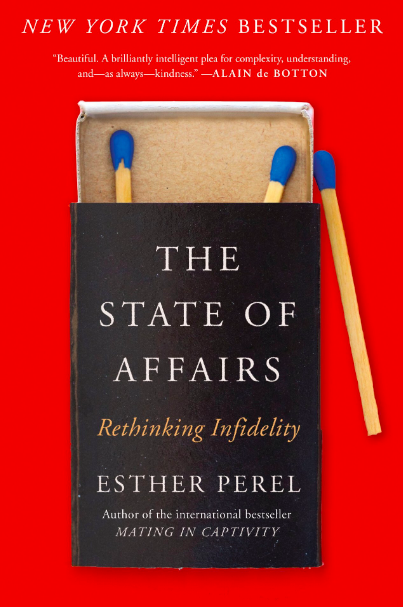
author: esther perel
year: 2017
publisher: harpercollins
notes in progress
The State of Affairs: Rethinking Infidelity
Introduction
After immersing myself in the topic, I have come to see that there is no singular truth, no comprehensive typology to describe this crucible of passion and betrayal. (viii)
part 1: setting the stage
ch. 1: a new conversation about marriage and infidelity
Convictions about extramarital affairs run deep in our cultural psyche. In the United States, where I live and work, the conversation tends to be visceral, loaded, and polarized. (4)
Contemporary discourse about the topic can be summed up as follows: Infidelity must be a symptom of a relationship gone awry. (5)
The term “adultery” itself is derived from the Latin word meaning corruption. (6)
Plenty of people care deeply for the well-being of their partners even while lying to them, just as plenty of those who have been betrayed continue to love the ones who lied to them and want to find a way to stay together. (7)
Affairs are an act of betrayal and they are also an expression of longing and loss. (10)
Catastrophe has a way of propelling us into the essence of things. I encourage you not to wait for a storm, but to address these ideas in a quieter climate. (13)
Once divorce carried all the stigma. Now, choosing to stay when you can leave is the new shame. (15)
When a couple comes to me in the aftermath of an affair, I often tell them this: Your first marriage is over. Would you like to create a second one together? (17)
ch. 2: defining infidelity. is chatting cheating?
What is clear is that all characterizations of modern infidelity involve the notion of a breach of contract between two individuals. (22)
At the core of betrayal today is a violation of trust: We expect our partner to act according to our shared set of assumptions, and we base our own behavior on that. (22)
For me, infidelity includes one or more of these three constitutive elements: secrecy, sexual alchemy, and emotional involvement. (24)
Secrecy is the number one organizing principle of an infidelity. An affair always lives in the shadow of the primary relationship, hoping never to be discovered. The secrecy is precisely what intensifies the erotic charge. (24)
One of the powerful attributes of secrecy is its function as a portal for autonomy and control. (25)
But we all know that renunciation can be as erotic as consummation. Desire is rooted in absence and longing. (26)
These stories make a critical point—many affairs are less about sex than about desire: the desire to feel desired, to feel special, to be seen and connected, to compel attention. All these carry an erotic frisson that makes us feel alive, renewed, recharged. It is more energy than act, more enchantment than intercourse. (27)
In my decades of working with couples, I’ve observed that those who are most successful in keeping the erotic spark alive are those who are comfortable with the mystery in their midst. Even if they are monogamous in their actions, they recognize that they do not own each other’s sexuality. It is precisely the elusiveness of the other that keeps them coming back to discover more. (29)
